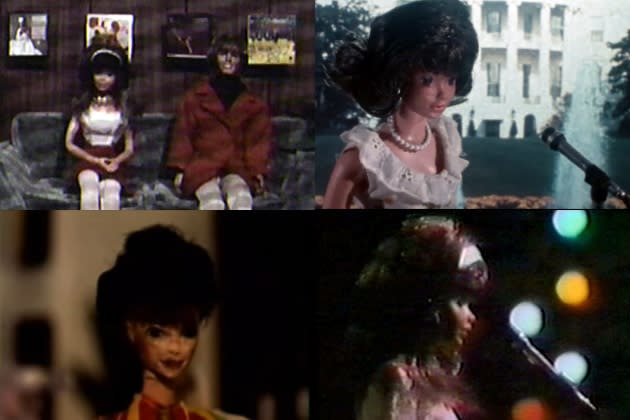The Banned Barbie Movie That Will Blow Your Mind
- Oops!Something went wrong.Please try again later.
- Oops!Something went wrong.Please try again later.
- Oops!Something went wrong.Please try again later.

The multiplex is about to get Barbiefied, but the soon-to-be hit isn’t the first film to feature Mattel’s favorite plaything. A previous Barbie movie was made in 1987, an experimental musical biopic that barely saw the light of day. The dolls sing, and they argue, and the most famous one dies. Superstar: The Karen Carpenter Story was an art school project by a mischievous but deadly earnest Bard College MFA student named Todd Haynes. Yes, before he went on to make major, Oscar-nominated films like Far From Heaven and Carol, Haynes was playing with dolls.
Superstar didn’t circulate for long; Karen Carpenter’s brother and bandmate, Richard, successfully sued for copyright infringement – the film features uncleared Carpenters music throughout, and he was also enraged by his portrayal in the film, since Haynes insinuates that Richard, who was married to his first cousin at the time, is gay – consigning the 43-minute creative burst to cult-curio status. But it has thrived there, with bootlegs becoming an avant-garde badge of honor. Entertainment Weekly named it one of the top 50 cult movies ever made. Today you can see blurry versions on YouTube.
More from Rolling Stone
It is well worth your time. Superstar remains haunting and quite moving in exploring Karen’s struggle with disordered eating, and her death from heart failure at the age of 32. Haynes makes frequent use of onscreen text: “We will see how Karen’s visibility as a popular singer only intensified certain difficulties many women experience in relation to their bodies.” And, of course, there are the Barbies, made up and dressed for realism, serving as the perfect vessels for Haynes’ vision.
Bart Weiss is among the film’s legions of fans. The founder of Dallas VideoFest, a longtime showcase for the avant-garde and out of the ordinary, he was never able to show Superstar due to legal restrictions. But he has one of those VHS bootlegs, as well as a DVD anthology of illegal works, released by the now-defunct Stay Free! magazine, that includes the film. He believes Superstar remains worthy of study.
“The first time you hear about it, you think, ‘Oh, it’s just going to be a spoof of Karen Carpenter,’” Weiss says. “But it’s actually a very serious film, and the idea of using these dolls is really about the sense of perfection, which is what was really driving Karen Carpenter crazy. After about 10 minutes the novelty just sort of recedes into the background, and the foreground is incredibly powerful.”

Barbie has long been castigated for perpetuating impossible standards of physical appearance, from the pert facial features to the ridiculously slender physique (although recent iterations have brought more diversity in this regard and others). Greta Gerwig’s new Barbie movie, starring Margot Robbie as the eponymous human doll, plays with this idea, casting the heroine into the real world, where all manner of imperfection lurks. But Haynes was way ahead of the curve. We see his Karen/Barbie push away food and leave boxes of laxatives laying around her room. She collapses onstage from exhaustion. Her family berates her. The filmmaker mixes in live-action footage of the Vietnam War, and talking-head commentary from fake experts, including an opinionated DJ played by Haynes himself.
Haynes was an avid student of semiotics, the systematic study of sign processes and meaning-making often used in analyzing film and literature. The Superstar Barbies are the ultimate signifiers, suggesting the artificial realm to which the film’s heroine aspires. The film is also a dryly caustic send-up of the music industry, with an A&M executive, voiced by the actor Rob LaBelle (who also plays Karen and Richard’s father), exclaiming his plans for The Carpenters with a coldness that only an inanimate object could conjure.
In other words, Superstar is not a comedy at all, but a sneakily subversive tragedy and an inspired wedding of form and content. The fact that you’re not supposed to be able to see it only adds to the thrill. It’s hard to blame anyone in Carpenter’s family for wanting to suppress it, especially given the music clearance issues. But it’s impossible to deny the film’s resonance and its palpable sympathy for Karen Carpenter’s plight. As one Barbie movie makes a box office fortune in the coming weeks, carve out a little time for its forbidden predecessor.
Best of Rolling Stone

